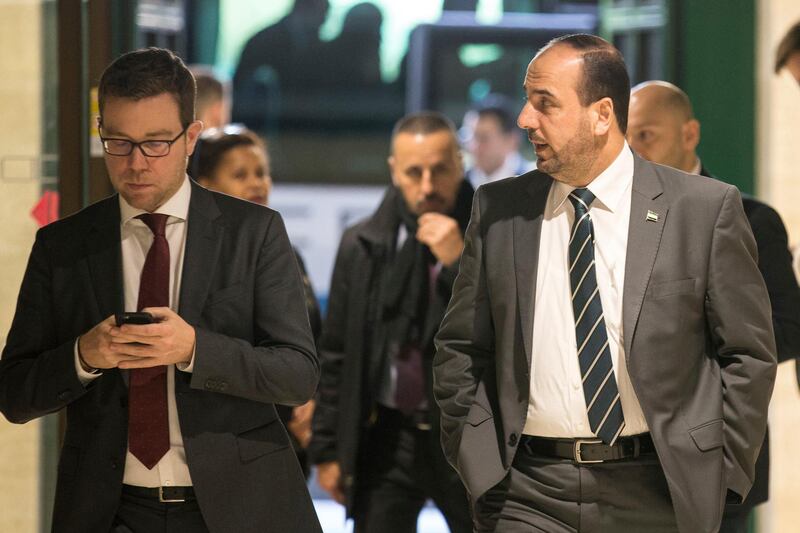UN-brokered peace talks on Syria continued in Geneva on Tuesday as mediators tried to kick-start face-to-face discussions between the opposition and regime representatives.
But opposition spokesman Yahya Aridi said the Damascus delegation had told UN special envoy Staffan de Mistura that they would not negotiate directly with the other side.
Mr Aridi said Mr de Mistura had told his delegation about the government’s stance, adding that the opposition considered face-to-face talks "to be a precondition”.
The opposition also said the government delegation was coming up with new conditions, making it difficult to move forward.
There was no immediate response from the government team in Switzerland, which met again with Mr de Mistura on Tuesday and did not speak to reporters after the meeting.
____________
Read more:
Putin orders withdrawal of Russian troops from Syria
Opinion: Removing Russian troops from Syria will backfire on Vladimir Putin
[ Syrian army and Iranian-backed militias push towards Idlib province ]
____________
Despite the lack of progress in Geneva so far, Mr Aridi said the UN-brokered talks presented an opportunity to begin a political process that “is the only lasting solution for our national nightmare”.
“The opportunity is to sit down, face-to-face, under the chairmanship of the UN special envoy, Staffan de Mistura, and begin negotiations on political transition on the basis of United Nations Security Council Resolution 2254,” Mr Aridi said.
“We are ready to sit down with the regime side this morning, this afternoon, whenever [they] come to the table, for a tough negotiation with different goals but no pre-conditions.”
“Our goal is a transition to make Syria safe for our people to come home,” he added.
After arriving a day late to the talks, which began on November 28, the government delegation then departed Geneva on December 2 in protest at the opposition's insistence on the absence of president Bashar Al Assad from any future transition period. Delegates returned to the Swiss city on Sunday, however, and have since resumed talks with UN officials.
But the opposition has been calling for the indirect peace talks to become direct.
On Wednesday, the opposition will host an event on the sidelines of the talks on the plight of Syrians trapped in the besieged Damascus suburb of Eastern Ghouta, a spokesperson told The National.
The eastern Damascus suburb is among the last remaining opposition strongholds in Syria and located in one of four so-called "de-escalation zones", where fighting between regime forces and rebels was supposed to cease under a deal brokered by regime allies Russia and Iran and rebel-backer Turkey earlier this year.
The event will feature Syrian opposition and civil society women — including an eyewitness account from inside Eastern Ghouta — to discuss the urgent action needed to address the humanitarian catastrophe in the suburb and protect Syrian civilians across Syria.
On Monday, Russian president Vladimir Putin held talks with his Turkish counterpart, Recep Tayyip Erdogan, in Ankara about the situation in Syria.
Damascus has regained control of much of Syria with the support of Russian air cover.
"As guarantors of Astana we will make a significant contribution to the process carried out in Geneva in order to find a lasting political solution to the Syrian conflict," Mr Erdogan said, referring to separate Syrian peace talks held in the Kazakh capital this year by Russia, Turkey and Iran, which established the de-escalation zones.






